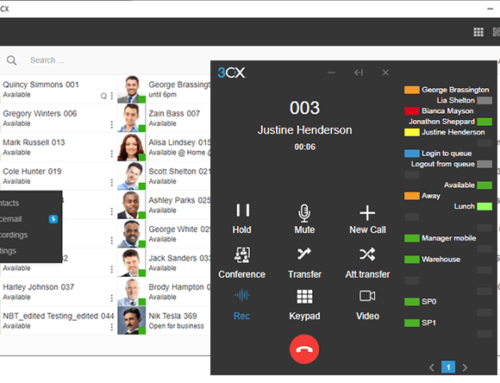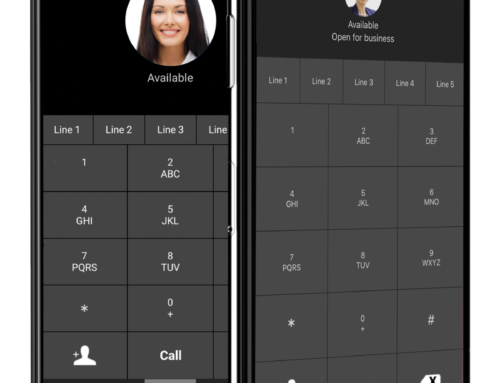6 Reasons to Host Your PBX in the Cloud
What is Hosted PBX?
A hosted PBX system is one in which your office phones connect through the Internet to a provider such as C1, that hosts your telephone system in a data center with connections to the world (cloud).
With UCaaS (Unified Communications as a service) becoming popular, a hosted PBX in the cloud will allow customers to maintain an advantage of new technologies without investing in the actual hardware. Simply benefit from its application.
1. Eliminate the Risk of Hardware Failure
Physical hardware ages and needs to be replaced with time. But, this can be time-consuming and costly for clients. With a cloud solution, the responsibility for keeping the infrastructure is shifted from the customer to the service provider. Updates and upgrades necessary to the continuance of technologies, are also taken care of by the provider. Users just need to have an active subscription to enjoy up-to-date technology without needing to set aside additional funds and resources to maintain the performance of their system.
2. Consolidating Communications While Simplifying Management
A communications suite typically includes voice, video, remote working, SMS, presence, and faxing—all under one roof. It’s easy to simplify and reduce your costs when you receive all your channels from one provider on a single bill. Consolidating also leads to better, more consistent communications with co-workers and customers by allowing them to use their preferred channels. Since cloud systems are software-driven and maintained by the providers, they’re usually easier to integrate with other software platforms used internally.
Imagine a multi-site office and/or an office with remote workers. Maintaining such a system is demanding as it requires the coordination & operation of several inter-dependant devices. The challenge with remote locations is that you typically need one installation at each site. If you have an issue, this can lead to site visits to any one of the inter-related sites just to troubleshoot the issue. As you can imagine, the costs soon stack up. A cloud system, on the other hand, enables each office to access the same virtual server using an internet connection. The result is having one simplified system that enables internal calling between locations.
3. Reduce Capital Expenditure
Investing in a new communications system can be expensive. Traditional systems require the purchase of common equipment, several servers, distinct cabling networks, maintenance and on top of it all, installation fees. By adopting a cloud strategy, a customer can expect to save thousands and conduct much of the work themselves. As providers often offer exceptionally reliable communications via WebClients and native iOS/Android apps for free, customers often elect not to replace their desk phone and prefer the mobility these apps provide.
Do it yourself and save on installation costs. One main benefit of Hosted PBX comes during setup. There’s nothing really to install on-site, so setting things up costs little or nothing.
Save on maintenance cost. Unlike on premise telephone systems, maintenance of Hosted PBX is much more wallet-friendly. Maintenance is often done remotely and automatically by your Hosted PBX provider and is often included in the overall cost.
4. Remote Workers
On premise systems limit your ability to take advantage of remote workers because they generally lack a direct connection to employees on the move. In contrast, moving your system to the cloud removes technological boundaries. Cloud solutions can route call traffic to any destination with an active internet connection, so routing calls to smartphones and home offices is just as easy as routing them to an office phone. Another benefit, specialist features typically used in the office can be utilized remotely such as call transfers and voicemail.
5. Enhance Security with Disaster Recovery
On premise systems are subject to more hack attempts than their cloud counterparts (61.4 attempts vs 27.8 attempts on average). The average IT administrator may well be tech-savvy, however it’s harder for them to provide best practice like encryption, security protocols, and active service monitoring. Here’s where private cloud or public cloud systems have their advantage. After all, cloud providers are specialists in cloud security.
With cloud computing, disaster recovery becomes much more cost-effective with significantly faster recovery times. Traditional recovery approaches typically entail offsite duplication of infrastructure and data. Many cloud providers will offer automatic failover to another data center in your monthly plan, so you can rest assured knowing a backup of your communications system is available should the worst happen. Using multiple providers in varying locations to backup your applications, can provide an extra peace of mind.
6. Increased Functionality and Simplify Updates
Traditional systems are limited in terms of features. Each feature requires specific hardware components and configurations in order to work. In the Cloud, you can access business productivity features with none of the hassle.
Upgrades can also come with a steep learning curve. They usually entail at least some downtime, costs and debugging sessions. With an on premise system, you bear the responsibility for the upgrades. Choosing a hosted service shifts that responsibility to the provider and because you’re in the cloud, it’s easier to roll out new updates and features at a faster pace. One of the most significant advantages of using Hosted PBX is that you get fast and automated updates, usually done in the background without you knowing. This ensures you’re always using a reliable and secure communications setup.
Let C1 give you a taste of Life in the Cloud
C1 offers and supports managed cloud service. Get a taste of life in the cloud and with a FREE demo from C1 and get started!







